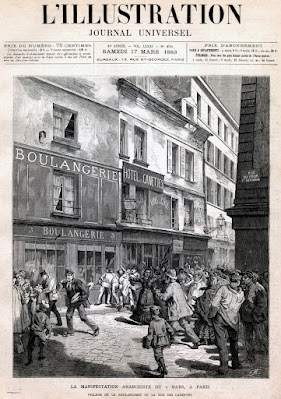And this begs the question...
Who is it --throughout this endless procession of tortures which
has been the history of the human race --who is it that sheds the blood,
always the same, relentlessly, without any pause for the sake of mercy?
Governments, religions, industries, forced labor camps, all of these
are drenched in blood. The murder is weary of their laws, their
prayers, and their progress. Again just recently, there were the
frenzied butchers who turned Paris into a slaughterhouse as the Commune
perished. There were pointless massacres, such as at Fourmies where the
bodies of innocent women and little kids tried out the ballistic virtues
of the Lebels machine gun for the first time. And there are always the
mines in which fifty, a hundred, or five hundred poor devils are
suffocated, swallowed in a single moment of horrible destruction, their
charred bodies never to see daylight again. And there are also the
horrid conquests of distant countries where happy races, unknown and
peaceful, groan under the boot of that robber of continents, that filthy
rapist of forest communities and virgin lands, the western slave
trader.
Each footstep taken in this society bristles with privileges, and
is marked with a bloodstain; each turn of the government machinery
grinds the tumbling, gasping flesh of the poor; and tears are running
from everywhere in the impenetrable night of suffering. Facing these
endless murders and continuous tortures, what's the meaning of society,
this crumbling wall, this collapsing staircase?
We live in ugly times. The misery has never been worse, because
it's never been more obvious, and it's never stood closer to the
spectacle of wasted riches and the promised land of well-being from
which it is relentlessly turned away. Never has the law, which protects
only the banks, pressed so hard upon the tortured shoulders of the
poor. Capitalism is insatiable, and the wage system compounds the evils
of ancient slavery. The shops are packed full of clothing, and there
are those who go about completely naked; the indifferent rich are puking
up food, while others perish from hunger in their doorways. No cry is
heeded: whenever a single, louder complaint penetrates the din of sad
murmurs, the Lebels is loaded and the troops are mobilized.
And that's not all.
A population does not live solely on its stomach. It also has a
life of the mind. Its intellectual joys are just as necessary as its
physical joys. It has a right to beauty just as it has a right to
bread. Indeed, those who could give it its higher pleasures, those who
could introduce to the people this vital beauty are treated like public
enemies, hunted down as criminals, hounded for being anarchists and
beaten like beggars. They are reduced to a solitary life. An enormous
barrier separates them from the crowd, by whom they are regarded as
repulsive spectacles, and over whom there is spread the enormous,
sordid, impenetrable veil of triumphant stupidity. We are witnessing an
incredible social moment: at this time, while abundant with great
thinkers, the public taste has never been so degraded, nor has ignorance
ever enjoyed such base pleasures. Surely, if the hour in which we live
is hideous, it is formidable as well: it's the hour of popular
awakening. And this hour is full of uncertainty. The patience of the
downtrodden and the dispossessed has lasted long enough. They want to
live, they want to enjoy, they want their share of all the happiness and
sunshine. Whatever the rulers do, reacting to their worst fears, they
will not forestall the inevitable course of events. We're touching upon
a decisive moment in human history. The old world is collapsing under
the weight of its own crimes, and is itself lighting the fuse of the
bomb that will blast it all away. This bomb will be all the more
terrible because it will contain neither gunpowder nor dynamite. It'll
contain compassion and an idea; two forces against which nothing can be
done.
ann arky's home.
































